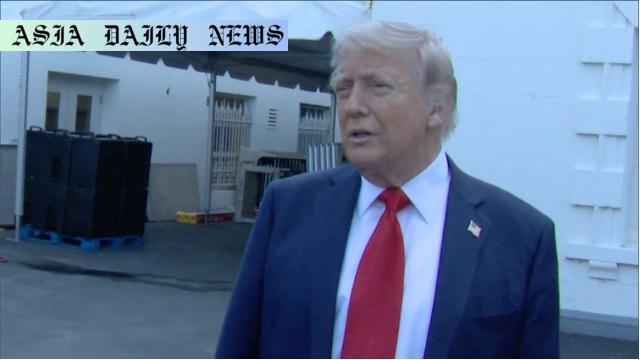Crimea: Trump lashes out at Zelenskyy for ‘inflammatory’ Crimea remarks in peace talks with Russia
Crimea remains a contentious issue in US-Russia-Ukraine diplomatic relations.
President Trump criticized Zelenskyy for his stance on Crimea’s annexation.
Zelenskyy reaffirmed Ukraine’s commitment to rejecting Russia’s claims over Crimea.
The US peace plan reportedly includes recognition of Crimea as Russian territory.

Introduction: Growing Tensions Over Crimea
The issue of Crimea has once again ignited global attention, as US President Donald Trump criticized Ukrainian President Volodymyr Zelenskyy for his unwavering stance on the territory. Zelenskyy maintained that Ukraine will not recognize Russia’s annexation of Crimea, a statement that Trump found to be “very harmful” to ongoing peace discussions between Ukraine and Russia. The diverging viewpoints between the two leaders underscore the complex geopolitical realities in addressing the ongoing conflict in Eastern Europe. This report delves into the intricacies of these developments, providing a comprehensive understanding of their implications.
Trump’s Criticism of Zelenskyy
In statements made on social media, President Trump expressed frustration over Zelenskyy’s remarks, claiming that such declarations make it harder to settle the ongoing war. Trump described Crimea as “not even a point of discussion” and took issue with Zelenskyy’s assertive tone, labeling it as “inflammatory.” These remarks highlight a stark difference in how the two leaders approach the issue, with Trump advocating for a more pragmatic and conciliatory pathway, potentially at the cost of compromising Ukraine’s territorial integrity.
Zelenskyy’s Resilient Stand on Crimea
President Zelenskyy, on the other hand, has continued to exhibit a resolute stance. On social media, he reiterated the principles laid out in the Crimea Declaration of 2018, issued by former US Secretary of State Mike Pompeo. This declaration emphasized the United States’ rejection of Russia’s annexation of Crimea. Zelenskyy’s decision to highlight this document underscores Ukraine’s firm position on the matter while also signaling trust in the United States’ historical alignment with Kyiv’s opposition to Moscow’s actions.
The US Peace Plan: A Contradictory Proposal?
Adding another layer of complexity to the debate is a reported US peace plan that some media outlets claim would formalize US recognition of Russia’s annexation of Crimea. This proposal stands in sharp contrast to longstanding American policy and commitments. If true, the plan could undermine Ukraine’s position and potentially align US policy closer to Russian interests, raising questions about the broader implications for NATO and other international alliances.
Broader Geopolitical Implications
The disagreements between Trump and Zelenskyy are emblematic of a broader debate about how to address Russia’s increasing assertiveness on the global stage. While Trump views strategic compromises as a means of conflict resolution, Zelenskyy’s approach underlines the importance of safeguarding national sovereignty and international law. Any resolution involving Crimea’s status could set a precedent for future conflicts, particularly those involving territorial disputes.
Conclusion: The Need for Strategic Unity
The growing discord between the United States and Ukraine over Crimea highlights the challenges of fostering international unity in the face of complex geopolitical disputes. While Trump criticizes Zelenskyy’s insistence on rejecting Russian claims to Crimea as detrimental to peace efforts, Zelenskyy’s position emphasizes the importance of abiding by principles of sovereignty and international law. Both perspectives underscore the urgent need for carefully balanced diplomacy, one that can bridge divides without undermining foundational principles of global governance.
Commentary
Trump’s Statements: A Pragmatic or Problematic Approach?
President Trump’s critical remarks regarding Volodymyr Zelenskyy’s stance on Crimea have sparked considerable debate. From one perspective, Trump’s comments could be seen as a pragmatic acknowledgment of harsh realities—Crimea is currently under Russian control, and an insistence on reclaiming it might hinder negotiations. However, his statements potentially risk alienating America’s allies, especially Ukraine, by signaling a willingness to compromise on an issue that many view as a cornerstone of international law.
Zelenskyy’s Stance: Upholding Principles at All Costs
President Zelenskyy’s decision to publicly reaffirm Ukraine’s claim over Crimea demonstrates his administration’s commitment to self-determination and sovereignty. While his dedication to protecting Ukraine’s territorial integrity is admirable, it also positions him in direct opposition not only to Russia but potentially to the United States, depending on how far the US willingness to compromise extends. Zelenskyy’s approach highlights a critical question: should nations prioritize pragmatism over principles in the name of peace?
Navigating the Path Forward
The path forward requires a nuanced understanding of the stakes involved. Both leaders represent different facets of diplomacy—Trump leaning towards compromise for immediate resolution, while Zelenskyy focuses on upholding long-term principles. The challenge lies in merging these approaches to craft a sustainable and just solution. The international community must remain engaged, offering mediation while ensuring that actions taken today do not undermine the legitimacy of international law in the future.


